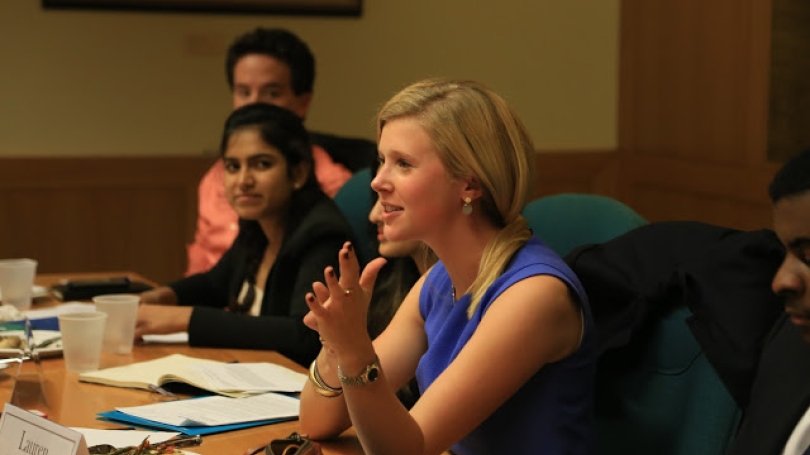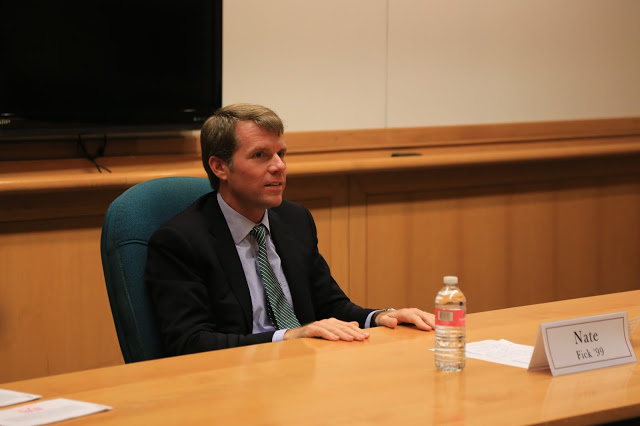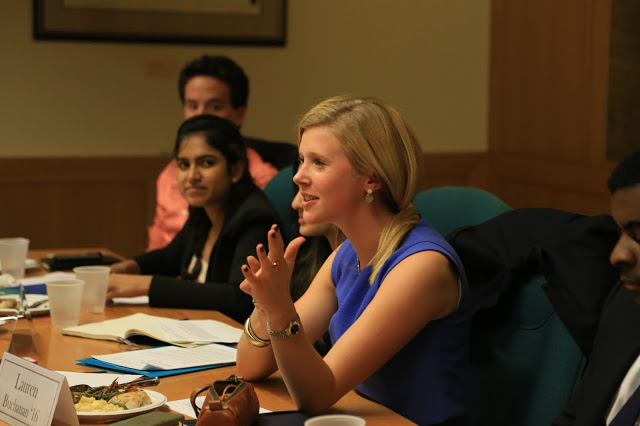
- Public Policy
- Leadership
- Funding
- News & Events
- About the Center
Back to Top Nav
Back to Top Nav
Back to Top Nav
Back to Top Nav
 |
| Nate Fick '99 talks to the Rockefeller Leadership Fellows about concepts he deems essential for the development of a leader. Photo by May Nguyen '18 |
Nathaniel Fick’s ’99 November 6th session with the Rockefeller Leadership Fellows emphasized five main concepts that he deemed essential for the development of a leader. These ideas included the difference of legal and moral authority, the fact that indecision is a decision in and of itself, the role of resilience, that being effective is much more important than being right, and that being risk acceptant (particularly with one’s human capital) is also crucial in being an effective leader. Elucidating the distinction between moral and legal authority was particularly relevant, as Bill Kerin ’16 had presented on the subject a week prior—within the context of how authority was a critical dynamic in hierarchical organizations, such as the military. Mr. Fick spoke in depth on each of these five points, adding that leadership development along such lines was best accomplished while doing something “real”.
 |
| Lauren Buchanan '16 asks a question during the session with Nate Fick '99. Photo by May Nguyen '18. |
He encouraged the Fellows to pursue something challenging, outside of most Dartmouth students’ comfort zones. He decried how frequently talented individuals at the College (almost automatically) selected the well-trodden path of consulting and finance. He suggested that Dartmouth students might better serve the world doing something they were passionate about, at least for a while. While this discussion sparked much debate between Mr. Fick and the Fellows as to validity of the former’s claim surrounding corporate recruiting, all agreed on the importance of doing something personally meaningful. Following this conversation, Mr. Fick conducted a series of thought exercises with the Fellows, in order to drive home the point made in the assigned readings, that of self-reliance.
The speaker proceeded to give each Fellow one of two scenarios that he himself had encountered while a Marine Reconnaissance officer in the 2003 invasion of Iraq. The situations were meant to provoke discussion among the Fellows, as neither circumstance had a clear-cut moral solution. These exercises effectively communicated that in such high-stress, high-stakes affairs (as Mr. Fick then found himself), self-reliance and confident, decisive action are imperative. Mr. Fick then proceeded to explain his thought processes in each instance at the time, echoing all of his previous take-aways, and explicitly explaining how each had played a role in his conduct as first a Marine lieutenant, and then also later as a scholar and businessman. Towards the end of the session, Mr. Fick took questions from the Fellows—both on session content, but also on any subjects that they thought pertinent to that night’s discussion. In early feedback from the Fellows, all agreed that the session had challenged them to think differently and more critically about their decisions as leaders. The speaker was very well-received by RLF, and has in years past ranked as being among the most popular sessions. We anticipate that this year will be no different.
Written by Bill Kerin ’16, Rockefeller Leadership Fellow